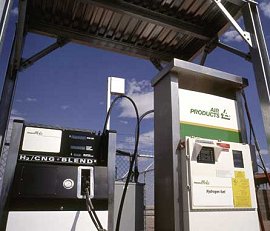Invention could fuel green cars
Hydrogen-powered cars that do not pollute the environment are a step closer thanks to a new discovery, which promises to solve the main problem holding back the technology. NASA audio "Rocks in your gastank"
 Although hydrogen is thought to be an ideal fuel for vehicles, producing only water on combustion, its widespread use has been limited by the lack of a safe, efficient system for onboard storage.
Although hydrogen is thought to be an ideal fuel for vehicles, producing only water on combustion, its widespread use has been limited by the lack of a safe, efficient system for onboard storage.
Scientists have experimented with ways of storing hydrogen by locking the gas into metal lattices, but metal hydrides only work at temperatures above 300°C and metal organic framework materials only work at liquid nitrogen temperatures (-198°C).
Now scientists at the University of Bath have invented a material which stores and releases hydrogen at room temperature, at the flick of a switch, and promises to help make hydrogen power a viable clean technology for the future.
Although its fuel to weight ratio is insufficient to make an entire hydrogen tank from it, the material could be used in combination with metal hydride sources to store and release energy instantaneously while the main tank reaches sufficient temperature, 300°C, to work.
They hope to have the working prototype ready within two to three years.
“With the growing concern over climate change and our over-reliance on fossil fuels, hydrogen provides us with a useful alternative,” said Dr Weller.
“We have been able to use hydrogen to power fuel cells, which combine hydrogen and oxygen to form electricity and energy, for a number of years.
“But whenever the fuel is considered for cars, we hit the stumbling block of how to store hydrogen gas in everyday applications.
“The new material absorbs the hydrogen into its structure and literally bristles with molecules of the gas. At the flick of a switch, it rejects the hydrogen, allowing us to turn the supply of the gas on and off as we wish.
“The fact that we discovered the material by chance is a fantastic advertisement for the benefits of curiosity driven research.
“In principle, it should be possible to produce ready amounts of hydrogen using seawater and solar cells, giving the next generation of vehicles an inexhaustible supply of environmentally friendly fuel.
“In fact other research in Bath’s Department of Chemistry is at the forefront of the solar cell research, new battery technologies and new fuel cell technologies which could help unlock what many people are calling the hydrogen economy.”
Greener News Room
Keywords:: HYDROGEN FUEL BATH UNIVERSITY POWER CELLS GREEN CARS
Relater:: Hydrogen as fuel
 Although hydrogen is thought to be an ideal fuel for vehicles, producing only water on combustion, its widespread use has been limited by the lack of a safe, efficient system for onboard storage.
Although hydrogen is thought to be an ideal fuel for vehicles, producing only water on combustion, its widespread use has been limited by the lack of a safe, efficient system for onboard storage.Scientists have experimented with ways of storing hydrogen by locking the gas into metal lattices, but metal hydrides only work at temperatures above 300°C and metal organic framework materials only work at liquid nitrogen temperatures (-198°C).
Now scientists at the University of Bath have invented a material which stores and releases hydrogen at room temperature, at the flick of a switch, and promises to help make hydrogen power a viable clean technology for the future.
Although its fuel to weight ratio is insufficient to make an entire hydrogen tank from it, the material could be used in combination with metal hydride sources to store and release energy instantaneously while the main tank reaches sufficient temperature, 300°C, to work.
They hope to have the working prototype ready within two to three years.
“With the growing concern over climate change and our over-reliance on fossil fuels, hydrogen provides us with a useful alternative,” said Dr Weller.
“We have been able to use hydrogen to power fuel cells, which combine hydrogen and oxygen to form electricity and energy, for a number of years.
“But whenever the fuel is considered for cars, we hit the stumbling block of how to store hydrogen gas in everyday applications.
“The new material absorbs the hydrogen into its structure and literally bristles with molecules of the gas. At the flick of a switch, it rejects the hydrogen, allowing us to turn the supply of the gas on and off as we wish.
“The fact that we discovered the material by chance is a fantastic advertisement for the benefits of curiosity driven research.
“In principle, it should be possible to produce ready amounts of hydrogen using seawater and solar cells, giving the next generation of vehicles an inexhaustible supply of environmentally friendly fuel.
“In fact other research in Bath’s Department of Chemistry is at the forefront of the solar cell research, new battery technologies and new fuel cell technologies which could help unlock what many people are calling the hydrogen economy.”
Greener News Room
Keywords:: HYDROGEN FUEL BATH UNIVERSITY POWER CELLS GREEN CARS
Relater:: Hydrogen as fuel



11:28 AM









<< Home